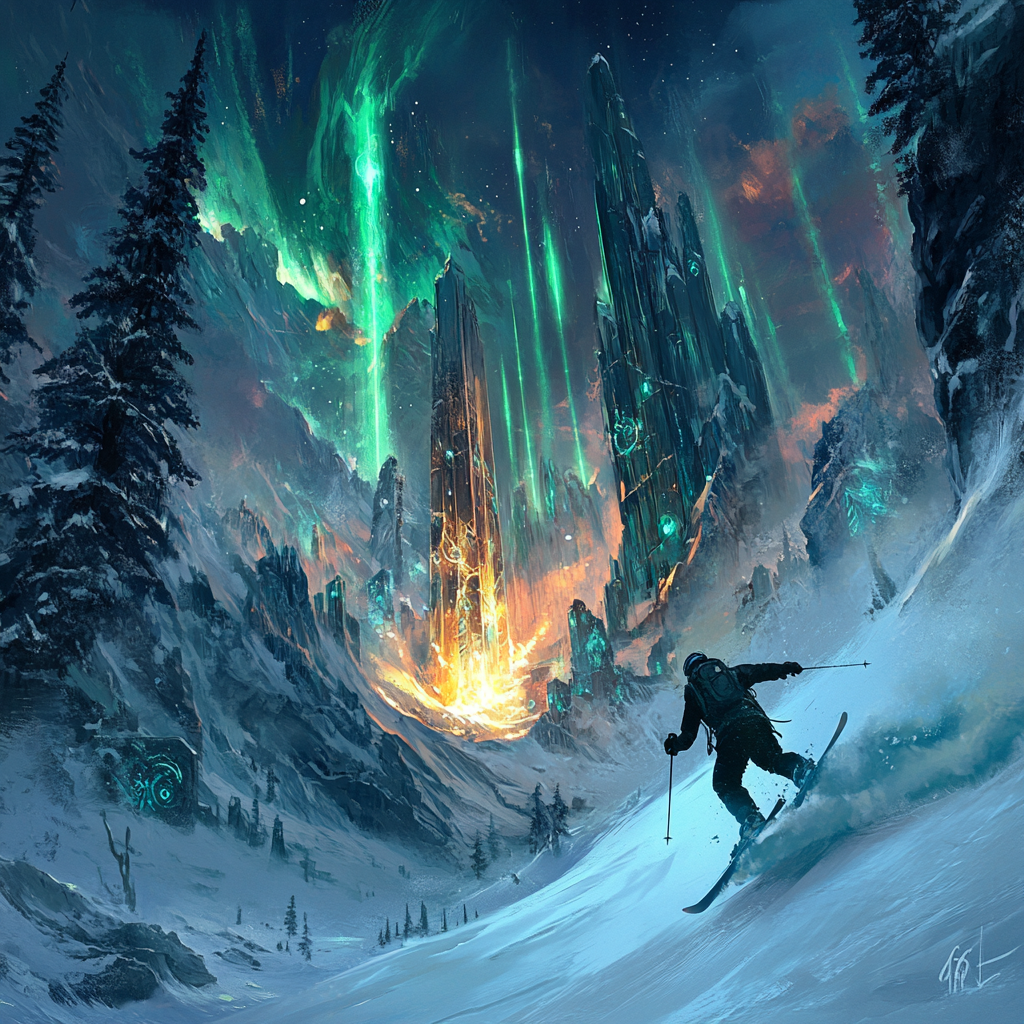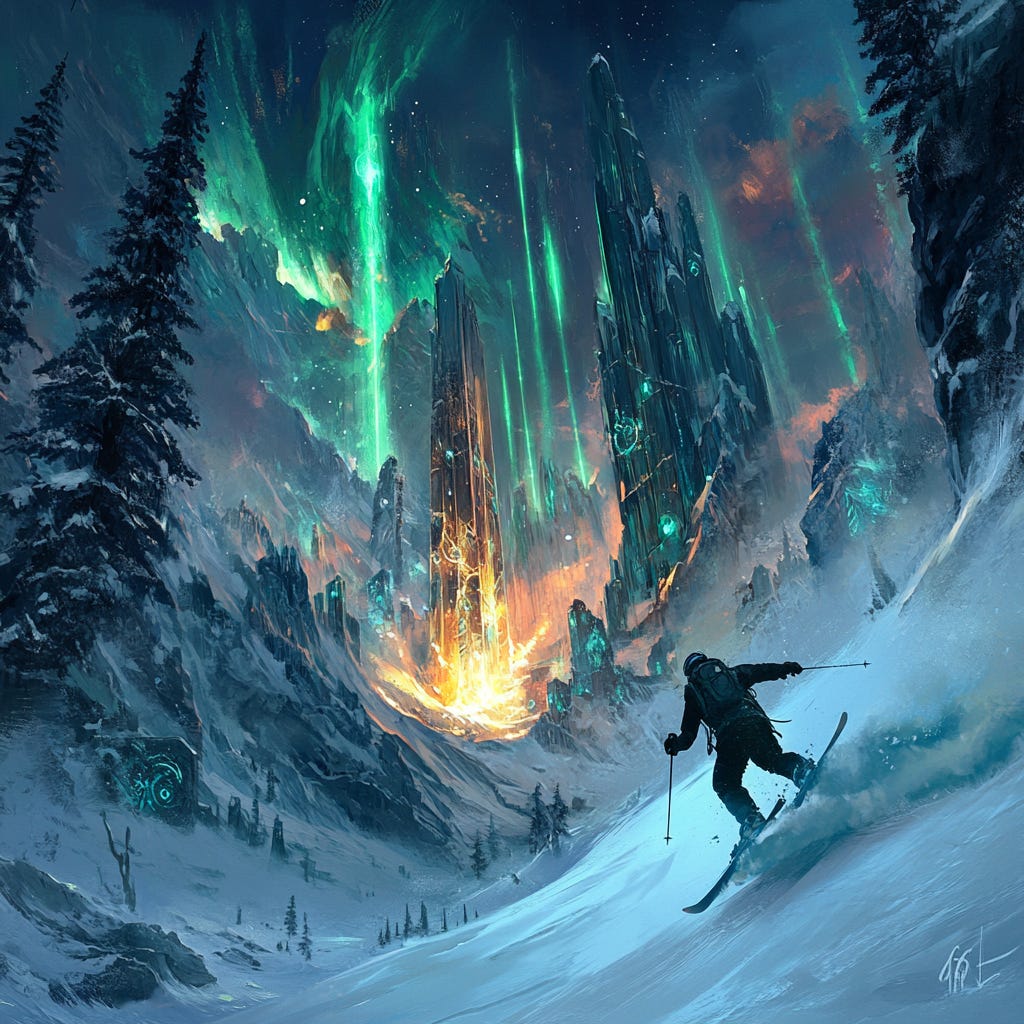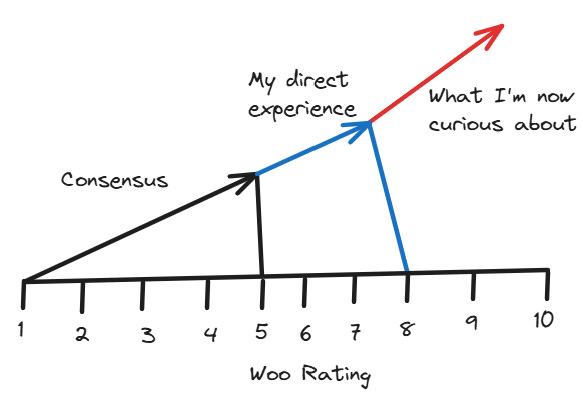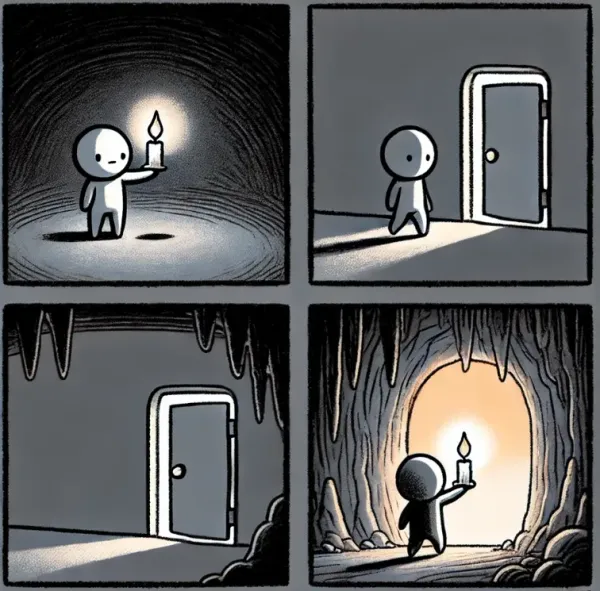What Woo Works?

[This article has anything from a 0/10 to a 10/10 Woo Rating; you get to decide].

Over the last three years, things have started to get really weird in my life.
Curiosity is my brand. I believe it reflects a relationship with a benign evolutionary force. That said, I have recently been drawn to topics that exist at the fringes of modern culture, as well as beyond my lived experience. The last three months in particular have been among the most intellectually challenging of my life. I published a fairly popular exploration of The Telepathy Tapes and I’ve been researching the topic of alien disclosure. This has required a near-constant dialogue with the skeptical mindset within myself and others.

Since founding our new community, I’ve been continuously presented with a world-class array of thinkers and practitioners. If Western scientific materialism is radically incomplete, then there should be people who can assist with our personal evolution operating in areas that aren’t “mainstream.” My exciting responsibility has been researching where transformational value might exist outside the Cave of Consensus.
Over the last three years I’ve personally explored this leading edge through a wide array of experts, mostly recommended by friends I trust. So far, I’ve met with (among others) a psychic, a medium, two Vedic astrologers, two Akashic field readers, two energy healers, three indigenous elders and seven professional “intuitives.” Some I’ve met once, others I’ve worked with for more than a year. They’ve each taught me their worldviews and made a wide array of different claims specifically about me personally. These claims have ranged from spot-on to barely plausible.
I desperately wish I could say I’ve has a single decisive experience that has definitively proven that any one of these modalities are “real.”
I have, however, made some helpful mistakes. The spiritual-industrial-complex attracts a predictable mix of charlatans and bad actors. Over this exploration I’ve gained a clearer sense of risks and dangers.1 There are a couple of power dynamics that have made me especially cautious. It can create an imbalance when someone “reveals” things about you only they can know due to their purported gifts. Even riskier is if they claim it’s only they that can resolve that problem they just discovered. Far better if they explain how you do it yourself. It’s also an extremely bad idea to seek tools and practices that allow you to control and manipulate others. In short, if the other person looks like they aren’t driven primarily by love: avoid.
I’m fairly sure this buffet approach to sampling different practices and practitioners probably isn’t “the right way to do this.” But this exploration hasn’t been a total waste of time either. It has forced me to constantly ask myself: how do I know what’s true?2
So I went through an exercise of writing down what I now believe, with a rough percentage confidence, and the relevant sources for my beliefs. [Bold is where I have had some degree of personal lived experience of the phenomenon].
- We can be left-brain locked, and that keeps us stuck and disconnected from the world (90% certainty).3
- That there is a direction of consciousness which guides us towards more wisdom, integration and complexity. It manifests through what we’re interested in or curious about (80%).4
- That this force feels like “love”, itself a powerful guiding force of the universe (80%).
- That we exist in an intelligent, interactive reality that signals the right direction to us through coincidences (80%).5
- That there is a God of some kind (70%).6
- That reincarnation is real and we are here to learn “soul lessons” that level-up our consciousness (70%).7
- That subtle psychic abilities like precognition, telepathy, remote viewing and clairvoyance exist (70%).8
- That the next stage in human evolution involves the wider emergence of these psychic abilities (70%).
- That this stage will be founded in the energy of “unconditional love” and unity consciousness (70%).
- That specific bodily energy centers like “chakras” are real and energy healing is possible in some form (60%).
- Muscle testing, or applied kinesiology, can help reveal your unconscious beliefs (50%).9
- Entities like spirit guides, angels, demons or aliens can exist in some form. Perhaps in other dimensions not immediately accessible to us (50%).10
- There will be an imminent (within the next 2-5 years) systemic crisis event of some kind (40%, yes... I know that’s still high).11
- All human knowledge is freely available in the Akashic Field/Morphic Field/Collective Unconscious for those with the skills to access it (30%).12
- That astrological readings, human design and birth charts can contain useful information about your character and future events (20%).13
- Every single thought or emotion we have is given form as an “elemental.” (20%).14
- That various technologically advanced human cultures, like Atlantis have existed before us on Earth. These civilizations were destroyed due to having advanced technology before they had the elevated consciousness to handle it responsibly (20%).15
[Pretty much all of these were at a skeptical 0% or not even on my radar before my journey into the mystery started in 2015. I’d love to know where you are on each of these and if there are other high woo rating topics worthy of further exploration].
The most revealing part of this exercise was that the areas I had the most confidence in have had the most practical application and positive impact on my life. All of these ideas have reinforced the most woo idea I am coming to believe: that we exist in some kind of “Earth School.” My steadily-increasing faith in the intrinsic intelligence and responsiveness of our reality has delivered virtually nonstop abundance to my life. It has also made me considerably more psychologically resilient to bad luck. Further up the woo scale, reincarnation wasn’t even on my bingo card as a possibility two years ago. Now, encountering the shocking strength of the empirical scientific research (!) has made me meaningfully more relaxed about my own mortality.
This has been “the woo that works.”
If anything like a consensus has emerged from our community’s collective explorations it’s that Internal Family Systems (IFS) is one of the most effective transformational modalities.16 It’s a therapeutic model that views the mind as composed of multiple sub-personalities or "parts," each with its own perspectives, emotions, and motivations. The goal is integration and personal transformation by recognizing that every part of us has a positive intention, even if its methods are misguided. As it’s increasingly mainstream, it’s probably a lower woo rating (although some of its proponents do seem to believe in the existence of demons).17 I have been eating my own cooking and have really enjoyed my own IFS experiences.
As I wrote above, the last few months have seen a particularly intense struggle with my inner skeptic. The benefit of parts work is that you can identify that part and dialogue with it. Despite what you might expect, my inner skeptic is hyperactive. It pulls up the drawbridge for anything more than a 2/10 woo rating. It keeps me safe from the many charlatans and crackpot theories in the New Age arena. It’s also justifiably afraid of social isolation once you openly discuss topics that are taboo, associated with conspiracy thinking, mental illness or loss of critical faculties. There’s also the very real risk of expanding your worldview too fast and getting “ontological shock.” IFS also means you can thank that protective part and suspend it for a while. Each time I notice that part closing down my curiosity I make a special effort to love it. And then I can become more open-minded without losing any analytical faculties. The guard dog stops barking when you pet it, but it still has sharp teeth if you need them.
I’m noticing a similar increasing tension among all the most curious and open-minded thinkers I know. Those that produce content for mainstream audiences are being drawn to the frontiers of our knowledge, but are worried about losing credibility and engagement if they go “too woo.” Those that work within traditional intellectual industries like tech and finance are concerned their colleagues will think they’ve lost their mind. It’s why there’s been so much demand for private communities like ours where you can pursue mystical ideas with other grounded, analytical people. But I’ve also noticed it’s a common knowledge game. Once you test the waters with the right people there’s a huge sense of relief, because they can feel the vibe shifting too. The good news is it seems like noticing the internal dissonance and engaging in dialogue with our skeptics actively integrates us all.
As I understand it, the goal of IFS is to align your parts around a goal you can all agree on. A central conclusion of my work is that “consciousness is the base layer.”18 So if everything is made of consciousness, the evolution of your unique consciousness makes for a pretty worthy goal. As many of the ways to do this are still at the leading edge, it’s going to require going over your skis from time to time. But the best way to handle that feeling is to lean forward and trust the flow.
"I think it's just going to get weirder and weirder and weirder and finally it's going to be so weird that people are going to have to talk about how weird it is.”
- Terence McKenna
1 I’d go so far as to recommend curious seekers listen to both Josh Schrei’s Emerald podcasts on protection and guardianship and on “why mindfulness isn’t enough.”
2 I really enjoyed Leading Edge member Anne-Laure Le Cunff’s essay Where are you on the Woo Spectrum?
1) Woo Critical (rejecting). You view certain practices as specious, a fun thing to do at best, but misleading and potentially dangerous at worst. You actively challenge claims about these and seek to expose what you consider pseudoscience, or avoid these topics entirely as not worth engaging with.
2) Woo Cautious (observing). You’re skeptical but remain open to evidence. You’re happy to engage in friendly conversations about these practices (although you might not be the one initiating them), but you’re not ready to try them personally.
3) Woo Curious (experimenting). You actively explore these practices while maintaining critical thinking. You’ve found some benefits but you’re not fully convinced, or you think there might be some yet-to-be-discovered scientific explanation to strange phenomena.
4) Woo Convinced (practicing). You’ve integrated these practices into your life based on personal experience and evidence you find compelling. You might even encourage or guide others through these modalities.
3 Sources: Dr. Iain McGilchrist, abundant personal experience.
4 Sources: Ervin Laszlo’s Holotropic Attractor, Ulisse Di Corpo’s Syntropy, abundant personal experience.
5 Sources: Jung, Campbell, abundant personal experience.
6 Sources: Strong personal suspicion married to a drug-free sponteneous peak experience in 2017.
7 Sources: Dr. Mona Sobhani, Many Lives Many Masters, UVA Research, esoteric reading.
8 Sources: The Telepathy Tapes (my take on them here). Dr. Mona Sobhani, Dean Radin, Jeffrey Kripal.
9 Source: David R. Hawkins
10 Sources: Esoteric reading, Alison Knox
11 Sources: Chris Bache’s LSD And the Mind of the Universe, EarthElders prophecies, my own intuitions, multiple psychic/astrological/intuitive readings.
12 Sources: Ervin Laszlo, psychic readings.
13 Sources: Two readings. This recent study made me marginally more skeptical as to the “reality” of astrology, or maybe just modern astrologers.
14 Sources: Esoteric reading.
15 Sources: Psychic readings, esoteric literature.
16 My public session with Nadja Taranczewski on Money and IFS has proven pretty popular.
17 See this longform discussion from rationalist psychiatrist Scott Alexander in Astral Codex.
18 See my episode with Mona Sobhani, PhD




